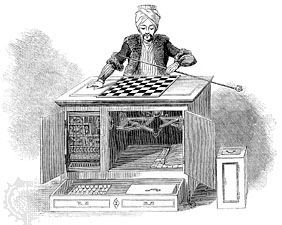 Religious positions are often compared to a house of cards, meaning that they are elaborate but extremely fragile edifices that can be brought down by the merest gust of wind. They are, however, nothing but. A house of cards has more foundation than substance, whereas religion only has unfounded matter. Blow all you want, it won’t come down so easily. No, there are more apt metaphors to produce on the subject.
Religious positions are often compared to a house of cards, meaning that they are elaborate but extremely fragile edifices that can be brought down by the merest gust of wind. They are, however, nothing but. A house of cards has more foundation than substance, whereas religion only has unfounded matter. Blow all you want, it won’t come down so easily. No, there are more apt metaphors to produce on the subject.
I was discussing that with my friend Fabien the other day over an unreasonable amount of Mac & Jack’s, when he made the excellent point that smart people tend to defend their faith as one defends the king in a game of chess.
Chess is all about pieces protecting each other. The queen protects a knight, protects a pawn, protects a bishop. In a religious argument, views are strategically advanced and defend each other in a very similar manner. What makes the strength of the argumentation is how well the different positions defend each other, how they form a strong and consistent whole that is very well thought out to work together. The relationship between the pieces is more important than their identities or what they represent. Circularity is far from being a weakness. Only the ultimate goal counts: defending the king, and defeating the opponent. The end justifies the means.
When two chess players of equal strength face each other, they will win half the time if they don’t end in a stalemate. It doesn’t matter who has the best-looking pieces or the ones that look the most real. It’s all black and white, and they’re interchangeable. The whites may have a small advantage as the first mover, but you only get that half the time.
Are we interested, however, in chess, or are we interested in truth? Winning an argument is utterly pointless in itself.
If it’s not the game we want to win, why play by those rules? Why not discard the rules altogether and expose the pieces for what they really are? This is not a stone tower in your hand, it’s a carved piece of wood. Towers don’t move anyways.
Only by always coming back to reality, by refusing to enter the game, can we hope to tear down religion’s stronghold on minds.